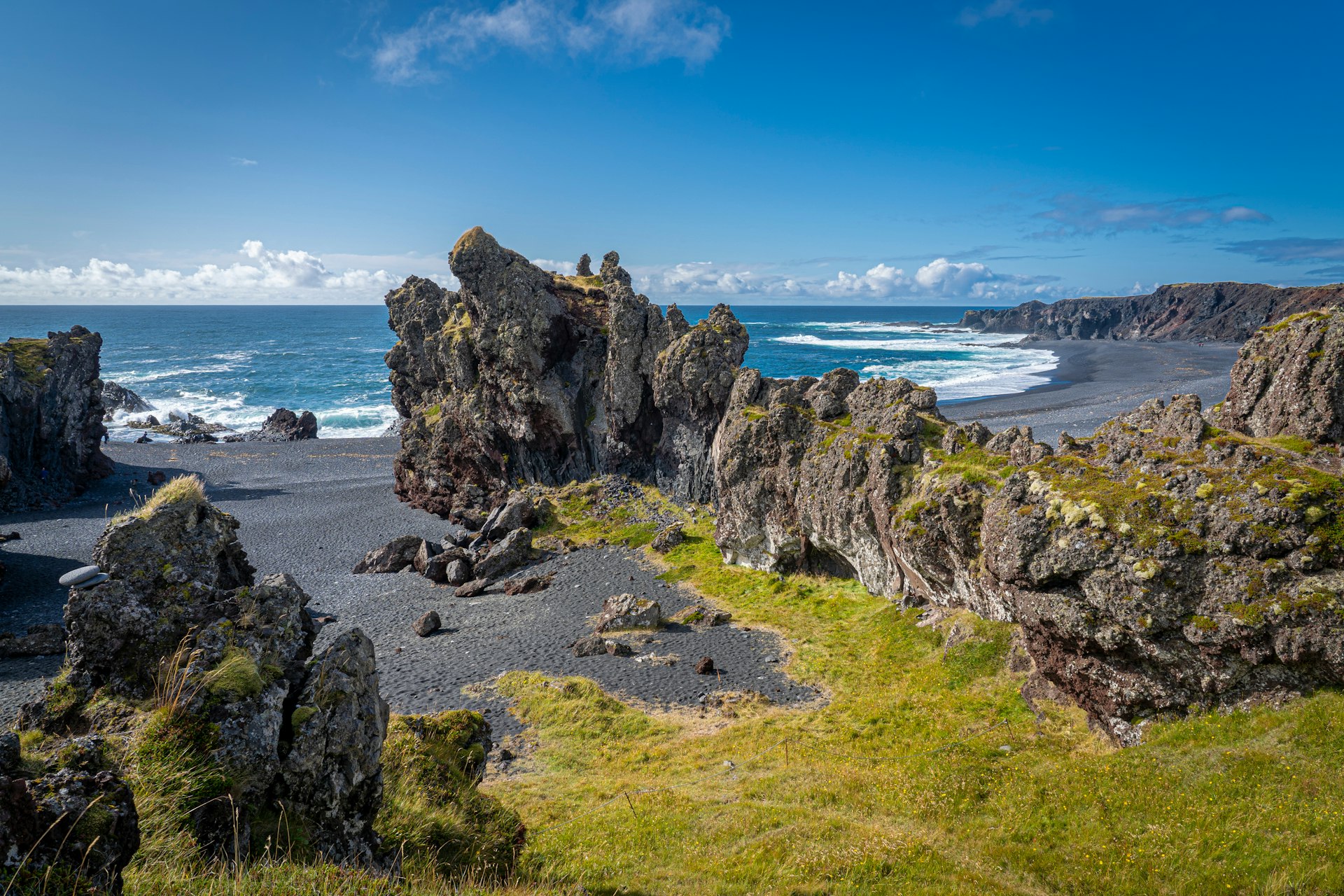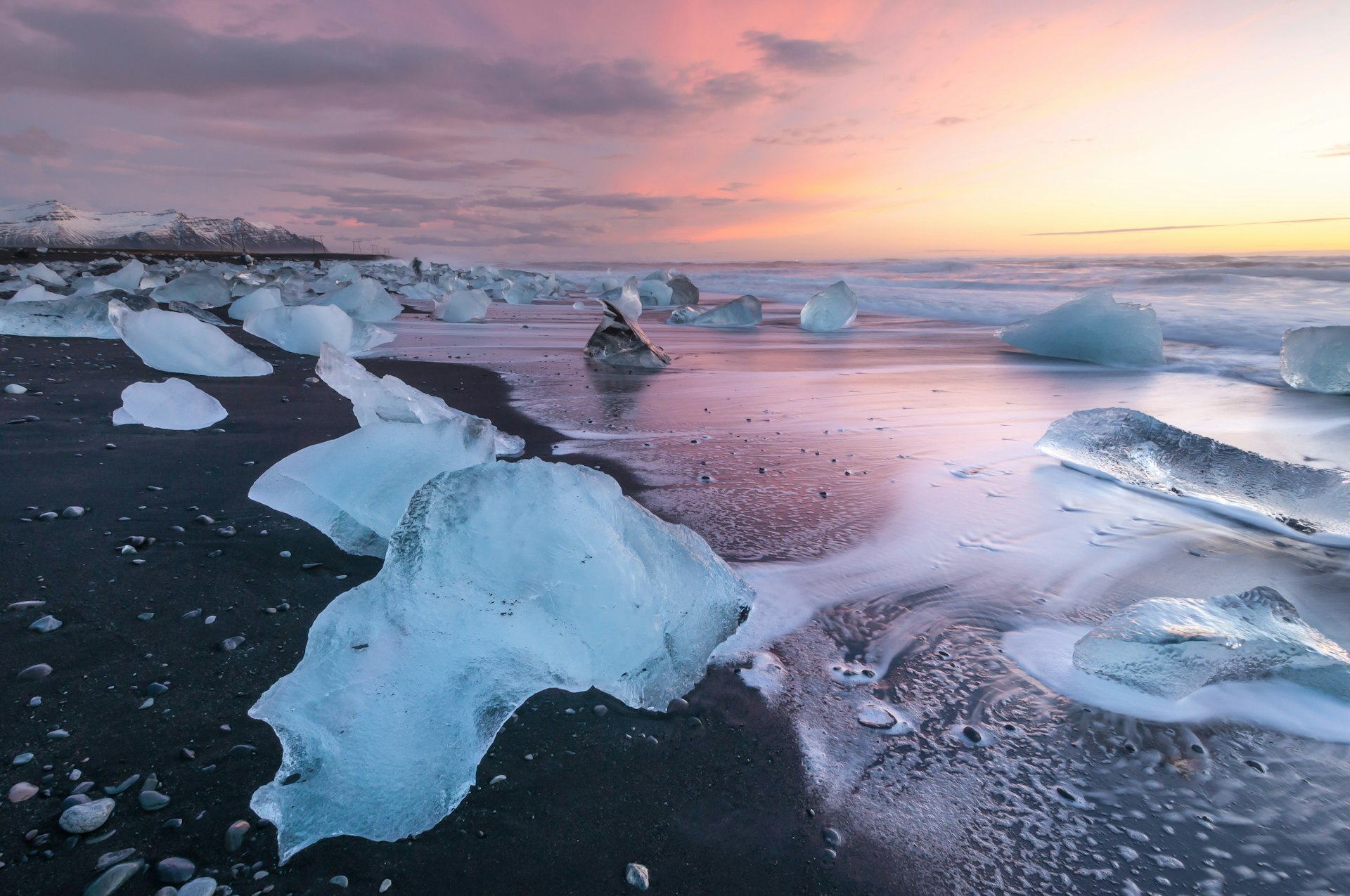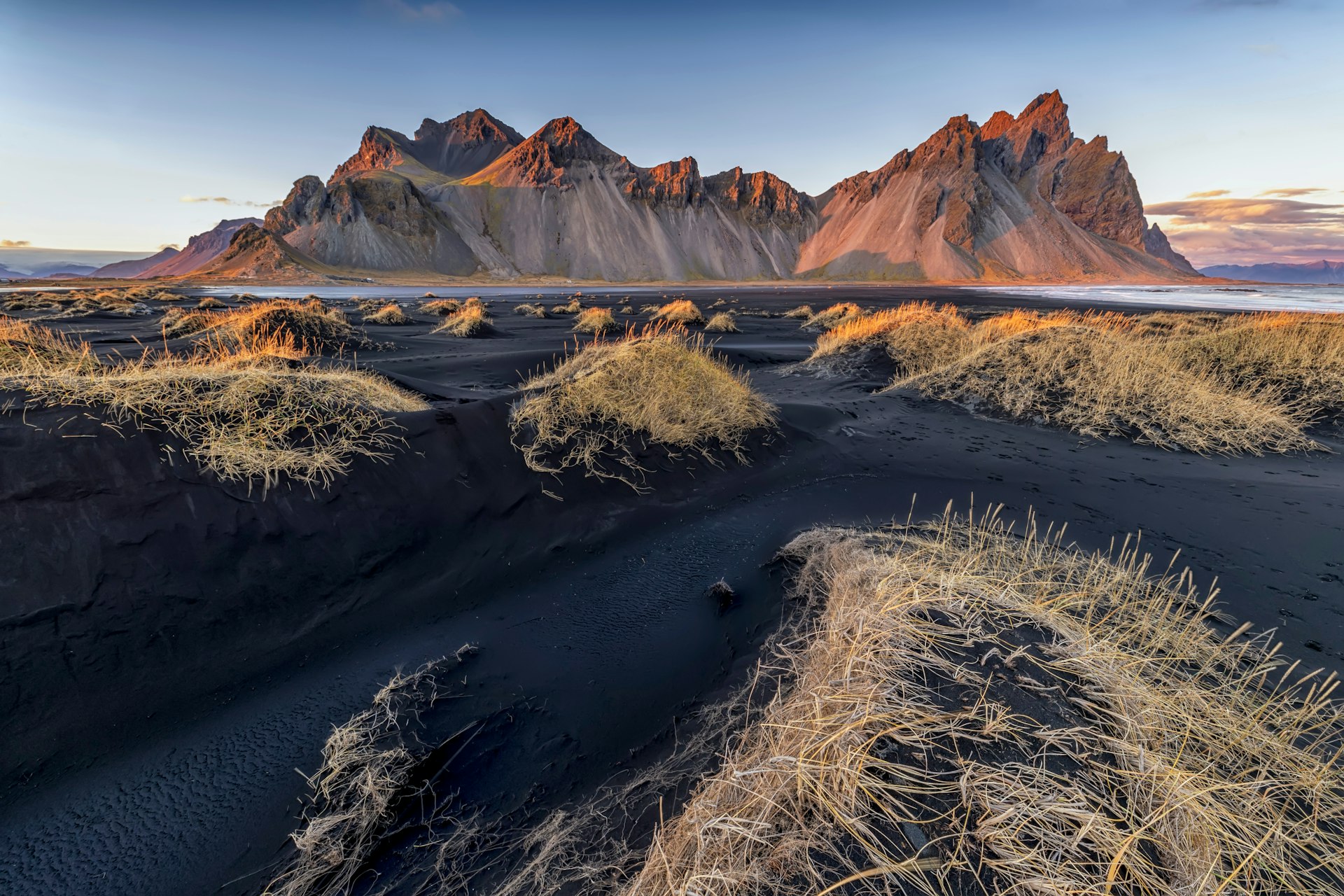With dramatic, rocky cliffs and velvety black volcanic sand scattered with icebergs, the beaches of Iceland are unlike anywhere else in the world.
Tiptoeing around the edge of the arctic, Iceland is defined by its stunning natural beauty, and the beaches are no exception. Fire and ice have shaped Iceland’s glaciers, mountains and people, and also the sandy covers that stud its indented coastline. From black volcanic beaches backed by mysterious basalt columns to geothermal beaches dusted with blond sand, Iceland offers miles of unspoiled ocean-side beauty.
Whether you’re a photographer, a lover of the great outdoors or just a curious traveler, spending time on the coast is one of the best things to do in Iceland. Here are some of the country’s unmissable beaches.
1. Reynisfjara, South Iceland
Near the quaint fishing village of Vík í Mýrdal in South Iceland, Reynisfjara is arguably Iceland’s most famous beach. From its stacked geometric basalt columns to its sweep of black sand with thunderous waves crashing on the shore, the beach is dark and moody but stunningly beautiful. It’s little wonder that Reynisfjara is such a firm favorite for travelers and locals.
Wander down to the edge of the beach and listen to the roaring waves of the Atlantic Ocean as they crash around the Reynisdrangar sea stacks, emerging from the foam-like monstrous fangs. These three tall basalt rocks are said to be the petrified remains of trolls that stayed out too late and were transformed into stone at sunrise. This mysterious piece of folklore only adds to the magic of one of the very best beaches in Iceland.

2. Djúpalónssandur Beach, West Iceland
The sand and pebble-filled shores of Djúpalónssandur Beach lie cozied at the foot of Snæfellsjökull, an ancient glacier-capped volcano to the north of Reykjavík. The name means “Deep Lagoon’s Sand,” a reference to the still, silent lake that sits inshore from the sand (though the Djúpalón lagoon is actually only 5m/16ft deep).
Ancient lava flows have created some striking rock formations, including the impressive Söngklettur (singing rock), which is said to be protected by elves. Emerging from the sand are the rusted remnants of a shipwrecked British trawler, left as a monument to those who lost their lives in the 1948 disaster.
Planning tip: Come here to stroll in a fairytale-like location, but keep a safe distance from the waves; they’re more dangerous than they appear.

3. Nauthólsvík Geothermal Beach, Reykjavík
This artificial geothermal beach is an ideal escape, just a couple of kilometers from downtown Reykjavík. Warm waters and imported golden sand kick the summer fun up a notch at this beach lover’s paradise. Water geothermally heated to between 15°C and 19°C (59°F and 66°F) is pumped into the lagoon during the summer months, making this one of the most appealing places to swim in the Reykjavík metropolitan area. Braver travelers can swim out into the chilly sea for a hot-and-cold spa experience.
Planning tip: Nauthólsvík Geothermal Beach is equipped with public changing rooms, steam baths and simmering hot tubs for a complete Iceland bathing experience. It’s free to enter in summer, but there’s a fee to enjoy the facilities in winter. Whether you’re sunbathing on the beach or lazily floating in the warm waters, this is Iceland’s most enjoyable day at the beach.

4. Diamond Beach, South Iceland
Have you ever walked among sparkling icebergs strewn across a stark and empty black sand beach? If not, add Diamond Beach to your bucket list immediately. The icy blocks that stud the shore are fragments of icebergs that broke off the nearby Breiðamerkurjökull Glacier, floated across the Jökulsárlón glacial lagoon and drifted out to sea before being broken up by the waves. A treasure trove of shining, glassy pieces washes up daily on aptly named Diamond Beach.
Planning tip: New icebergs are constantly breaking off the glacier, but resist the temptation to climb on any of the icy blocks. The edges are slippery and sharp, and floating icebergs can flip over, trapping you under the water. Use your time instead to create magical photos of this strange and surreal location; it’s one of the most evocative sights in South Iceland.

5. Rauðisandur Beach, Westfjords
The name Rauðisandur translates to “Red Sands,” and visitors will quickly see why. Stretching along the picturesque and remote coast of the Westfjords for over 10km (6 miles), Rauðisandur is one of the most gorgeous beaches in Iceland. Lush, red-toned sand meets looming cliffs and windswept grasslands on a completely unspoiled stretch of Icelandic shoreline.
Planning tip: Due to its remote location, the journey to Rauðisandur is lengthy (a drive of 395km/246 miles if you set out from Reykjavík), but it’s well worth the trek. Plus, there are camping options in the area to add a bit more adventure to your stay. Just be ready for a restless night: the wind whispers eerily along the shore, and spooky Viking burial grounds dot this lonely sweep of coastline.

6. Vestrahorn Beach, Southeast Iceland
Where the mountains meet the sea, the atmospheric Vestrahorn Beach is framed by a line of jagged peaks and dusted with charcoal-black sand. Just a 10-minute drive from the quaint town of Höfn in Southeast Iceland, this is one of the most scenic beaches in Iceland thanks to the distinctive sawtooth ridge of Vestrahorn mountain, which climbs to 454m (1490ft). The mountain owes its distinctive dark color and spiky formation to the high levels of iron and magnesium in its gabbro rock.
Planning tip: Come in winter to see the mountain covered in snow, and hang out on the sandy beach on clear nights to watch the Aurora Borealis performing magic tricks in the sky – an unforgettable Iceland experience.

7. Grótta Island, near Reykjavík
Sitting right at the tip of the Seltjarnarnes Peninsula and set aside as a nature reserve, this island is a little bit of wilderness on the edge of Iceland’s capital. Locals love the island for its charming coastline, sprinkled with smooth stones and dark sand, and lorded over by a historic, 19th-century lighthouse. At low tide, visitors can easily walk over to the lighthouse to get a better look.
Thronged by seabirds, Grótta Island is one of the best spots for natural encounters in the Reykjavík area, and you can walk here from downtown. You might even catch a surfer or two trying out the waves of this peninsula.
Planning tip: With little light pollution, Grótta Island is one of the best places in Reykjavík to see the northern lights in winter.
